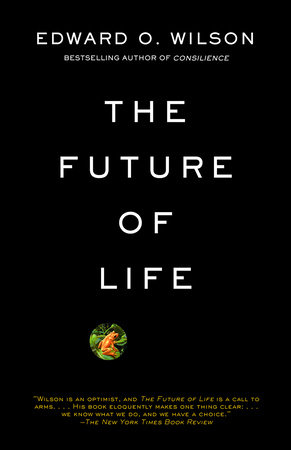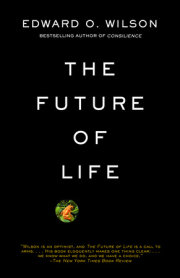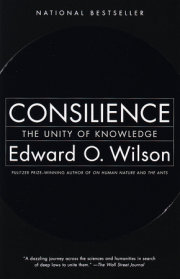A Letter to Thoreau
Excerpted from the Prologue
Henry!
I am at the site of your cabin on the edge of Walden Pond. I came because of your stature in literature and the conservation movement. I came because of all your contemporaries, you are the one I most need to
understand. As a biologist with a modern scientific library, I know more than Darwin knew. I can imagine the measured responses of that country gentleman to a voice a century and a half beyond his own. It is not a satisfying fantasy: the Victorians have for the most part settled into a comfortable corner of our remembrance. But I cannot imagine your responses, at least not all of them. You left too soon, and your restless spirit haunts us still.
I am here for a purpose: to become more Thoreauvian, and with that perspective better to explain to you, and in reality to others and not least to myself, what has happened to the world we both have loved. . .
The natural world in the year 2001 is everywhere disappearing before our eyes--cut to pieces, mowed down, plowed under, gobbled up, replaced by human artifacts.
No one in your time could imagine a disaster of this magnitude. Little more than a billion people were alive in the 1840s. They were overwhelmingly agricultural, and few families needed more than two or three acres to survive. The American frontier was still wide open. And far away on continents to the south, up great rivers, beyond unclimbed mountain ranges, stretched unspoiled equatorial forests brimming with the maximum diversity of life. These wildernesses seemed as unattainable and timeless as the planets and stars. That could not last, because the mood of Western civilization is Abrahamic. The explorers and colonists were guided by a biblical prayer: May we take possession of this land that God has provided and let it drip milk and honey into our mouths, forever.
Now, more than six billion people fill the world. The great majority are very poor; nearly one billion exist on the edge of starvation. All are struggling to raise the quality of their lives any way they can. That unfortunately includes the conversion of the surviving remnants of the natural environment. Half of the great tropical forests have been cleared. The last frontiers of the world are effectively gone. Species of plants and animals are disappearing a hundred or more times faster than before the coming of humanity, and as many as half may be gone by the end of this century. An Armageddon is approaching at the beginning of the third millennium. But it is not the cosmic war and fiery collapse of mankind foretold in sacred scripture. It is the wreckage of the planet by an exuberantly plentiful and ingenious humanity.
The situation is desperate--but there are encouraging signs that the race can be won. Population growth has slowed, and if the present trajectory holds, it is likely to peak between eight and ten billion people by century's end. That many people, experts tell us, can be accommodated with a decent standard of living, but just barely: the amount of arable land and water available per person, globally, is already declining. In solving the problem, other experts tell us, it should also be possible to shelter most of the vulnerable plant and animal species.
In order to pass through the bottleneck, a global land ethic is urgently needed. Not just any global land ethic that might happen to enjoy agreeable sentiment, but one based on the best understanding of ourselves and the world around us that science and technology can provide. Surely the rest of life matters. Surely our stewardship is its only hope. We will be wise to listen carefully to the heart, then act with rational intention with all the tools we can gather and bring to bear.
Henry, my friend, thank you for putting the first element of that ethic in place. Now it is up to us to summon a more encompassing wisdom. The living world is dying; the natural economy is crumbling beneath our busy feet. We have been too self-absorbed to foresee the long-term consequences of our actions, and we will suffer a terrible loss unless we shake off our delusions and move quickly to a solution. Science and technology led us into this bottleneck. Now science and technology must help us find our way through and out.
Copyright © 2002 by Edward O. Wilson. All rights reserved. No part of this excerpt may be reproduced or reprinted without permission in writing from the publisher.









